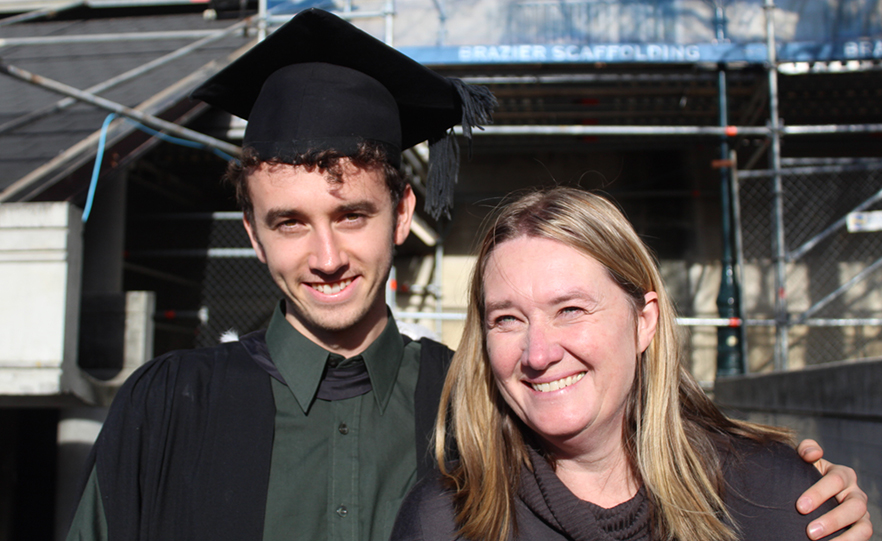
Lead researcher Quinn Campbell, with his Mother and co-researcher Nicola Swain, an Honorary Associate Professor at Otago's School of Physiotherapy.
To sing is to live well. That is the simple message of a study led by an Otago Department of Psychology researcher and recently published in Journal of Health Psychology.
The study, led by Master's student Quinn Campbell, highlights the benefits of singing for both physically and psychological health and wellbeing, irrelevant of the existence of any underlying health conditions.
"The study strongly supports the message to just get out there and sing as your life will be better for it," says Quinn. "Sing more, sing often, sing badly, sing in harmony, and preferably sing together with friends, flatmates or a choir."
For the study Quinn teamed up with his Mum Nicola Swain, an Honorary Associate Professor at Otago's School of Physiotherapy, and long-time family friend Dr Sally Bodkin-Allen, of the Southern Institute of Technology's School of Music.
The research investigated studies that measured the physical and psychological effects of singing, for individuals with chronic health conditions and for those regarded as healthy, and found that group singing positively affects wellbeing and health measures for both cohorts.
"The studies highlighted a strong correlation in improvements in both physical and psychological effects, such as lower rates of depression and anxiety, increased lung function, and higher measures of vitality indicators," Quinn explains.
The study supports experiential research undertaken by the collaborating researchers, including on Outreach Singing, a socio-altruistic approach to making music developed in Australia.
Professor Swain and Dr Bodkin-Allen have been studying the impact of this singing programme amongst different cohorts, including a group of students at Southland Girls' High School who participate in Outreach Singing as part of Community Breakout Week.
Dr Bodkin-Allen explains there are real issues with singing confidence amongst both adults and young people in the community, and their results show a significant improvement in self-esteem and resilience measures, as well as general singing confidence and attitudes towards singing.
"Students involved in Outreach singing interact with rest home residents, they sing one-on-one, making eye contact, and often hold hands with them while they are singing together," Dr Bodkin-Allen says.
"Many people just don't sing, and the combination of our Outreach studies and the current research highlights the value of singing in our daily lives," Dr Bodkin-Allen says.
As past-President of the New Zealand Pain Society, Associate Professor Swain adds that about 20% of New Zealanders experience chronic pain and singing offers a wonderful intervention for those suffering pain or indeed depression, anxiety, heart or lung problems, or just general stress.
"Unlike more medical treatments, singing has no side effects, and the health benefits of singing are backed up by well-established science," Associate Professor Swain says.
"This review that Quinn did brings all this science together and shows that even a single session of singing can have measurable health benefits. And if low confidence is an issue, then just sing with a group, the national anthem at a game, a waiata at work, or Happy Birthday to a friend – it all counts."
Quinn says it has been an amazing opportunity to collaborate on this research with his Mum and Sally, whom he has known all his life.
He says that, given the research has highlighted just how strong the health benefits of singing are, it has justified how much he likes to sing and has also made him a strong advocate for telling others to go get out there and sing.
The study has future implications for the benefits of singing to address a range of health issues such as such as diabetes, heart disease, chronic lung problems and mental health issues.






